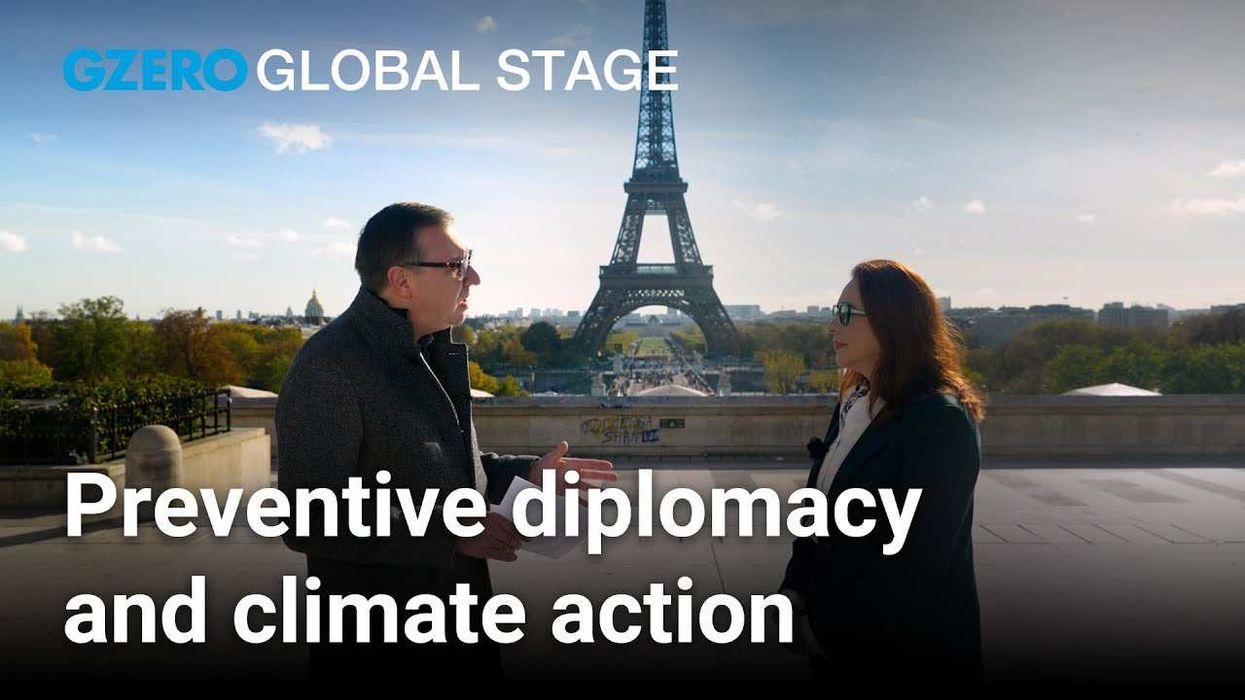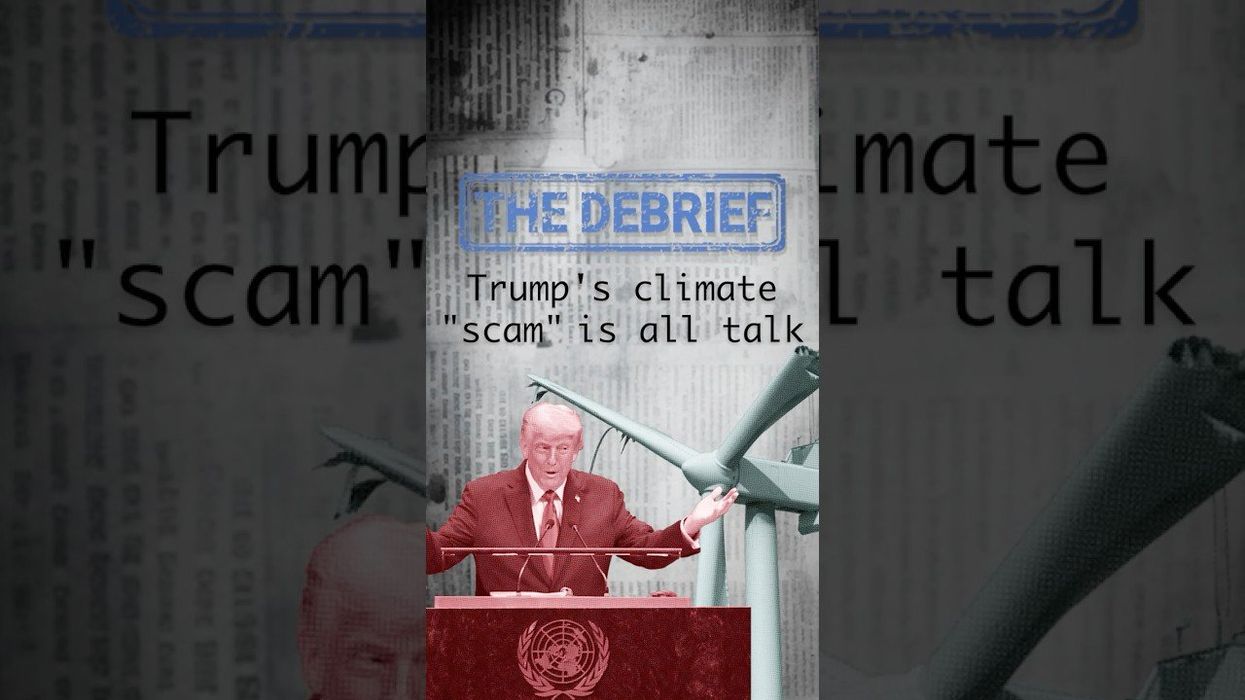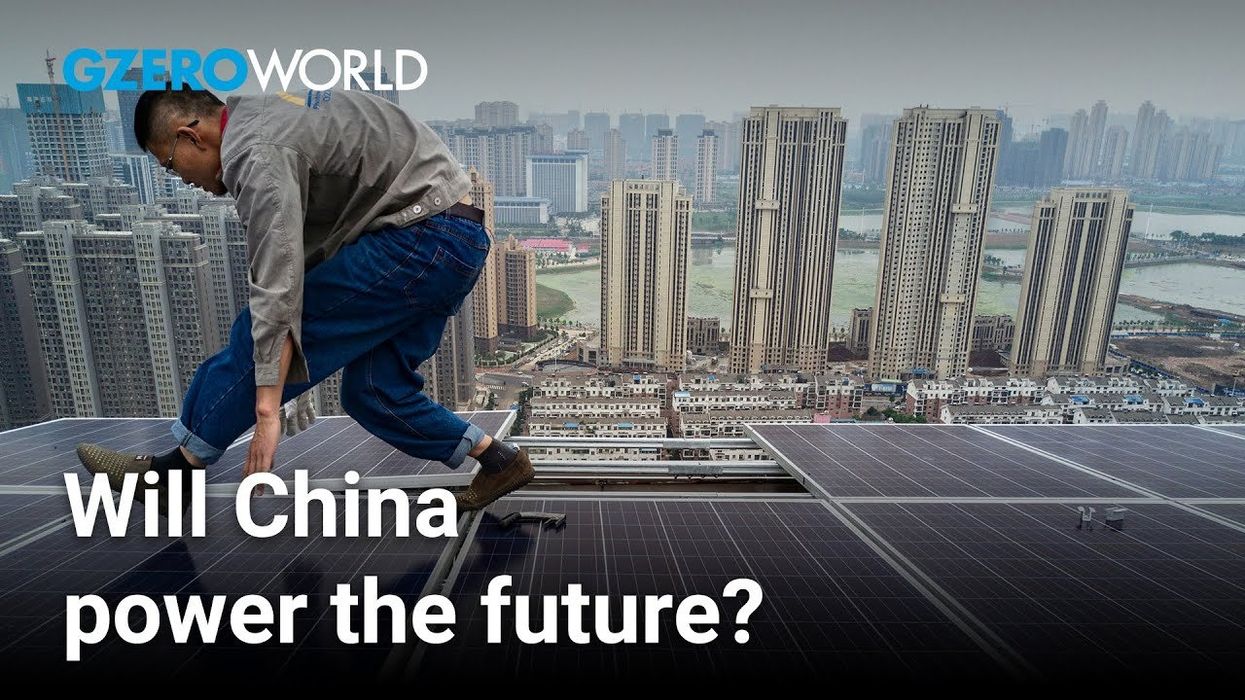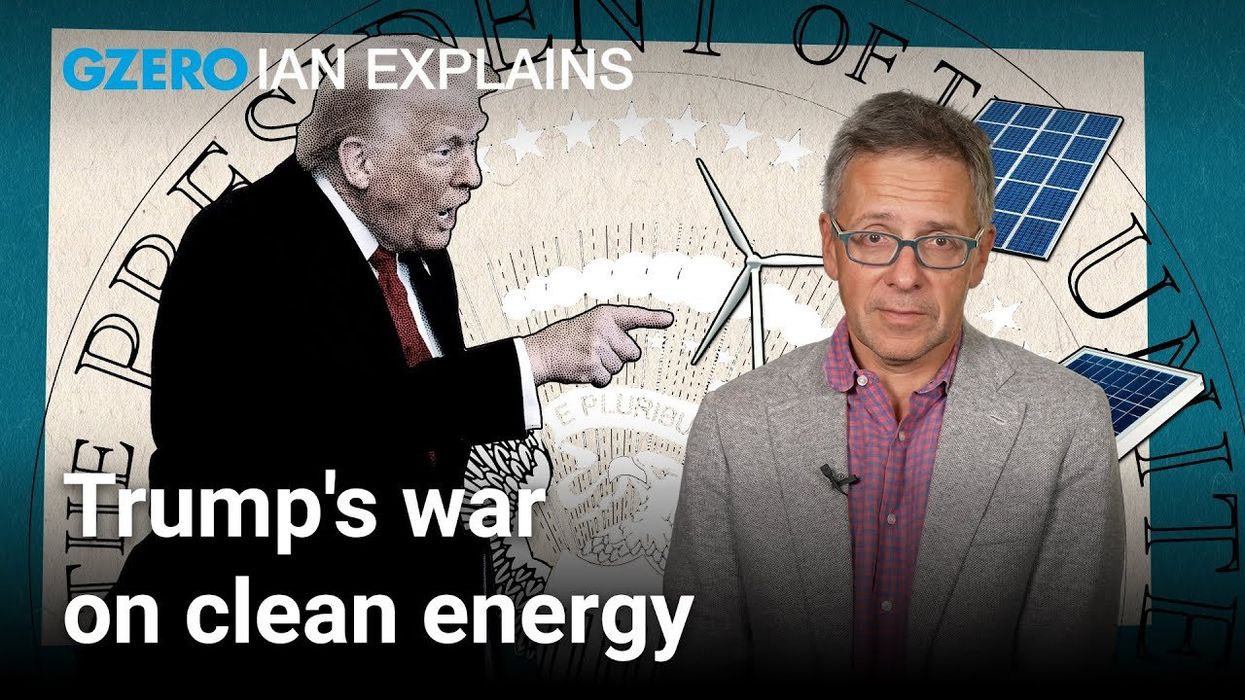Trending Now
We have updated our Privacy Policy and Terms of Use for Eurasia Group and its affiliates, including GZERO Media, to clarify the types of data we collect, how we collect it, how we use data and with whom we share data. By using our website you consent to our Terms and Conditions and Privacy Policy, including the transfer of your personal data to the United States from your country of residence, and our use of cookies described in our Cookie Policy.
Climate
Brazil's President Luiz Inácio Lula da Silva and Germany's Chancellor Friedrich Merz walk after a bilateral meeting on the sidelines of the UN Climate Change Conference (COP30), in Belem, Brazil, on November 7, 2025.
When it comes to global warming, the hottest ticket in the world right now is for the COP30 conference, which runs for the next week in Brazil.
What’s COP30? It’s the 30th installment of an annual UN-backed event that brings together world leaders, diplomats, and experts for two broad purposes: finding ways to slow global warming and to address the impacts of climate change.
This year’s meeting, held in the Amazon rainforest city of Belém, comes amid huge new challenges to the climate agenda. The government of the world’s largest economy, the US, is once again actively hostile towards climate policy. The world’s leading philanthropist, Bill Gates, has recently downgraded climate change as a key concern.
What’s more, it’s been ten years since nearly 200 countries signed the Paris Agreement, pledging to reduce emissions in order to keep global temperature rises within specific targets. The efforts have largely failed, and the targets are now unreachable.
So what is achievable at this year’s COP? To learn more we sat down with Herbert Crowther, an energy and climate expert at Eurasia Group. Our conversation has been lightly edited.
GZERO: Herbert, you’re on your way to COP 30 in Brazil. How does this COP feel different from previous ones? Are the stakes higher? Lower?
This COP feels different because there isn’t a single trademark deliverable or negotiating point. Most other recent COPs have had that: last year at COP29 it was about setting financing targets, for example.
This year the larger question is how to find ways to address the current geopolitical obstacles. The Brazilian COP hosts have tried to frame this in terms of COP30 being about “implementation” of prior commitments rather than negotiating new commitments, but that framing has faced some pushback.
So it’s all much more unpredictable than other recent gatherings. From a negotiating point of view, the stakes are perhaps lower – but from a political sentiment point of view, the stakes are higher.
GZERO: The Trump administration has left the Paris Agreement. Bill Gates is focusing on other things. That means two huge, longstanding pillars of support for climate policy are now gone. Who is going to drive this stuff now?
Those are real headwinds. But there are other data points that are less foreboding. Besides the US, no other country has departed the Paris Agreement. The costs of low-carbon energy continue to drop, driven in significant part by Chinese manufacturers. The private sector generally remains bullish on decarbonization technologies. And many philanthropies will still engage in climate work, even as they change their public framing around it or prioritize other issues. The area where politics may be most disruptive is in the question of financing: projects may be more difficult to finance and more reliant on government support.
GZERO: What’s a realistic expectation of what can be achieved at this COP? What are you most optimistic about and what are you most pessimistic about?
We will likely see more agreements between countries on carbon trading, as well as some new targets for financing and monitoring projects that help countries to adapt to climate change.
I’m more pessimistic on the ability of COP30 to find a political message that will respond effectively to this geopolitical environment. In many ways, a positive vision for COP30 is simply to maintain credibility for the multilateral process, and to create conditions for a COP31 next year that has more time to identify solutions tailored to this geopolitical environment.
GZERO: A lay reader, or a person who doesn’t follow climate policy closely, might look at the headlines about how countries keep failing to meet their obligations, and wonder “why keep having COP at all?” How would you answer that?
That’s a very understandable concern. What is sometimes lost by those headlines is the value of the COP process as a choreography mechanism to encourage countries to regularly deepen their long-term climate ambitions. Most countries have done this ahead of COP30 with new 2035 targets, even if those commitments are not as ambitious as many observers would like. Recalibrating expectations and finding a new political framework for the whole process will be a topic of discussion in Belém.
No matter what happens, you’ll be in Brazil! What’s one thing you’re excited to do there that has NOTHING to do with climate change?
I am looking forward to seeing Belém – my first time in the Amazon! I will be consuming lots of Brazilian espressos throughout the week.
Have a couple for us too – enjoy!
“It means building peace, having a very strong and well-equipped intellectually oversight machinery, to have a scenario-building machinery, to have early warning systems in place,” she tells GZERO Media’s Tony Maciulis on the sidelines of the Paris Peace Forum. Espinosa calls for a “refocus, not austerity,” to strengthen the UN’s early warning systems and invest in prevention. “One dollar in prevention saves a thousand in response,” she notes.
Turning to climate, she urges faster action ahead of COP30 in Brazil, warning that progress “is not matching the science.” Latin America, she says, must lead with resilience and unity despite political divides.
This conversation is part of GZERO Media’s Global Stage series, presented in partnership with Microsoft.
At the UN, President Trump called climate change a "con job" and a "scam." But here's the thing, says Eurasia Group's Franck Gbaguidi, it doesn't matter what you call it, it matters what you do about it. And so far, Trump has changed how we talk about climate change, but not what's being done about it.
President Trump has made it a mission to roll back the clock on climate policy, like withdrawing again from the Paris Climate Agreement, doubling down on fossil fuels or demonizing offshore wind. But really, when it comes to action, that's pretty much about it.
What he has done is changed the way sustainability advocates, world leaders, or even large corporations, are talking about climate change. So now they no longer talk about energy transition, but they talk about energy security. Before you couldn't talk about nuclear power here in New York during climate week because Fukushima and many other incidents, now there's an excitement that we've never seen before.
France, Egypt, South Korea, all these countries are ramping up efforts and they're doing so under the framework of energy security. Take climate change. We no longer talk about climate change per se, but we focus on water security. That's because people can deny that climate change exists, but they won't deny droughts, they won't deny floods. Take the US and Mexico and all of the water access issues at the border. Take China and India when it comes to dam constructions and all of the controversies that come with it. Same thing with Greece and Bulgaria and their water agreement. Water stress has become a major issue, and work is being done both on the policy side and on the investment side to ensure that we have the right technology to address the problem.
Final example, emission reductions. We no longer talk about it now we focus on adaptation. So you're not hearing as much about those big, shiny targets to reduce emissions. That era is pretty much over and done with. Most countries are no longer announcing ambitious targets, they're focusing on adaptation. Take India, for instance, where outdoor workers now, for a big part of the year, can only work until 10:00 a.m before it gets too hot. So it's about addressing the world that we live in today rather than preventing one we don't want to live in tomorrow.
So why does it matter? If you watch the news, you may think that we are in a "stop the clock" moment. Big countries are pulling out of climate accords. They're no longer prioritizing the topic. I mean, here in New York at the UN, artificial intelligence and many other hot button issues have basically pushed climate to the back burner. But that is in fact hot topic. There is still plenty being done. So yes, Trump will keep calling climate change scam. But that won't stop what companies, investors, and world leaders are doing to address it.
As the world speeds up the transition to renewables and away from fossil fuels, China is betting bigger than anyone else on the energy technologies that will power the world for decades to come. Environmentalist and author Bill McKibben joins Ian Bremmer on GZERO World to talk about Beijing’s wholehearted embrace of clean energy compared to the US. It’s not just that they’re manufacturing solar panels or putting up wind farms, McKibben says, they’re investing in a technology that will transform the global economy.
Energy demand is rising, driven in large part by data centers that power AI, and McKibben argues that the only way to meet that demand is with cheap, clean energy. While it’s true China still burns large amounts of coal, increasingly it’s used as a second or third tier power source because of the cost compared to solar and wind. China’s investment in renewable energy gives them a competitive edge in technologies that will reshape the balance of power—literally and figuratively.
“China become the world's first electro state,” McKibben says, “They're learning how to use that flood of cheap clean energy to run everything around them.”
GZERO World with Ian Bremmer, the award-winning weekly global affairs series, airs nationwide on US public television stations (check local listings).
New digital episodes of GZERO World are released every Monday on YouTube. Don't miss an episode: subscribe to GZERO's YouTube channel and turn on notifications (🔔). GZERO World with Ian Bremmer airs on US public television weekly - check local listings.
Over the past decade, renewable energy has exploded. Technology is improving. Costs are plummeting. This is now the fastest energy transition in human history. But just as the world goes all in on renewables, the US is doubling down on fossil fuels. Does it risk being left behind in the race to power the future? Environmentalist and author Bill McKibben joins Ian Bremmer on GZERO World to discuss the sudden and overwhelming surge of clean energy installation and generation over the past two years, China’s push to dominate the renewable market, and whether the Trump administration’s policies will put the US at a disadvantage.
The White House has cancelled funding solar and wind projects and is pushing other countries to buy more oil and gas, but McKibben says the scale and pace of the global energy transformation is just too powerful to ignore. McKibben’s new book, "Here Comes the Sun," argues that renewables aren’t just a climate fix—they’re a political and economic opportunity to reshape our future. He has no doubt that 30 years from now, we’ll run the planet on sun and wind simply because of economics, but also warns the world will face serious problems if it takes that long to get there
“Fossil fuels become harder to get over time. Renewable energy is the opposite,” McKibben says, “We now live on a planet where the cheapest way to make energy is to point a sheet of glass at the sun.”
GZERO World with Ian Bremmer, the award-winning weekly global affairs series, airs nationwide on US public television stations (check local listings).
New digital episodes of GZERO World are released every Monday on YouTube.Don't miss an episode: subscribe to GZERO's YouTube channel and turn on notifications (🔔). GZERO World with Ian Bremmer airs on US public television weekly - check local listings.
Is the clean energy revolution finally here? Over the past few years, the world has experienced a sudden and overwhelming surge in renewable energy installation and generation, outpacing even the most optimistic predictions from experts. This week on the GZERO World Podcast, Ian Bremmer talks to with Bill McKibben, an environmentalist and author, about the stakes and scale of the global energy transformation. His new book, "Here Comes the Sun," argues renewables aren’t just a climate fix—they’re a political and economic opportunity.
Costs from solar and wind have dropped so dramatically in the last 36 months that they’re now the cheapest way to produce electricity worldwide. And energy independence has become a national security issue amid so much global instability. But while China and Europe are pushing ahead in the race to power the future, the Trump administration is doubling down on fossil fuels. What happens if the US puts the brakes on clean energy, just as the rest of the world hits the gas? Or rather... plugs in the solar battery? Do we risk being left in the dark?
Subscribe to the GZERO World Podcast on Apple Podcasts, Spotify, Stitcher, or your preferred podcast platform, to receive new episodes as soon as they're publishedPresident Trump has made no secret of his distaste for wind and solar and preference for fossil fuels. His administration has canceled subsidies for renewable projects, lifted drilling restrictions on federal land, and is pressuring allies to buy more American oil and gas. On Ian Explains, Ian Bremmer breaks down the reality of the energy transition and whether US policies will slow down global progress in moving toward a renewable future.
No matter what the White House says, the incentives for renewables are hard to ignore. From Texas to Saudi Arabia, India to China, governments all over the world are embracing solar and wind not just for the planet, but for economic and security reasons. Clean energy is now the cheapest power source almost everywhere. And, amid rising instability, energy independence has become a safety and security issue. You can’t embargo the sun. No one controls the wind. Fossil fuels still matter, but the question is no longer if the world will transition. It's how fast.
GZERO World with Ian Bremmer, the award-winning weekly global affairs series, airs nationwide on US public television stations (check local listings).
New digital episodes of GZERO World are released every Monday on YouTube. Don't miss an episode: subscribe to GZERO's YouTube channel and turn on notifications (🔔). GZERO World with Ian Bremmer airs on US public television weekly - check local listings.




